AfA’s SMACC and WSAVA Join Forces to Tackle Online Animal Cruelty Content
- Trần Dieu-Hang - AfA Coalition (Comms)

- May 8, 2025
- 2 min read

Today, Asia for Animals (AfA), through its Social Media Animal Cruelty Coalition (SMACC), and the World Small Animal Veterinary Association (WSAVA) are delighted to announce a new collaboration focused on addressing online animal cruelty content.
This joint effort was sparked by the significant number of online cruelty reports received by both organizations, underscoring the urgent need to raise awareness and provide guidance on this issue — both to the general public and the veterinary community. A wide variety of animal cruelty can be found online, especially on social media. This includes everything from extreme physical abuse to videos showing inadequate care for animals. Domestic animals like cats and dogs are often the victims, but other species such as primates, reptiles, and birds also suffer in this content.
Whilst responding to, or sharing of animal cruelty may seem a good way to raise awareness, resharing these images can actually support ongoing animal abuse as such content is ‘popularized’. Instead we recommend that you follow SMACC’s five steps:
Be aware: Educate yourself on different forms of cruelty, as some content may appear innocent but involves suffering behind the scenes, like animals being dressed or trained for entertainment
Do not watch: Avoid viewing animal cruelty videos, as every view helps spread the content more widely.
Do not engage: Refrain from commenting or reacting, even negatively, since any interaction helps promote the content through social media algorithms.
Do not share: Sharing, even with the intent to raise awareness, only increases its reach and popularity.
Report it: Use the platform’s reporting functions to flag the content. Though removal may take time, consistent reporting helps platforms address these violations.
As social media users, it is crucial that individuals take appropriate action to counter such content when they come across it, and have it removed from social platforms. Reporting content to the relevant social media platforms is one of the most important actions you can take.
The Social Media Animal Cruelty Coalition (SMACC) is a working group of the Asia for Animals Coalition, founded in 2020. Its members share the same mission, to address the growing problem of animal cruelty content on social media platforms as one united voice. SMACC works by gathering and analyzing data on such content, producing reports to raise awareness, and engaging with social media platforms like Facebook, Instagram, TikTok, and YouTube to mitigate the spread of this harmful material. The coalition also educates the public on identifying and reporting online cruelty, while collaborating with other organizations to combat these issues more effectively.
The WSAVA is a global community of more than 300,000 veterinarians from 117 member associations. Together, we work to advance the health and welfare of companion animals worldwide and to represent the interests of companion animal veterinarians on a global stage. In support of our mission, our core activities focus on four key pillars: advancing companion animal welfare; creating globally relevant Standardization Guidelines in key areas of veterinary care; providing continuing education (CE) for companion animal veterinarians; and increasing understanding of the important role of companion animals within the One Health movement.
Learn more about WSAVA’s works since their establishment in 1959: About Us | WSAVA
Read more about social media cruelty content and the work of SMACC: Who we are | SMACC (smaccoalition.com)






Comments